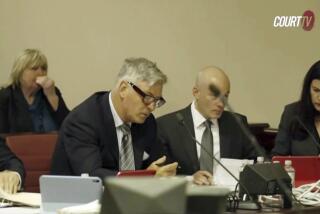Jurors Hard to Find for Nesler Case : Courts: Sentiment runs high regarding a woman accused of killing her son’s alleged molester. But lawyers say an impartial panel will eventually be seated.
- Share via
SONORA, Calif. — After three days of questioning about 100 potential jurors in the Ellie Nesler murder trial, one thing remains clear to both sides. Finding a jury of 12 impartial peers will not come easily.
For one thing, this was the most sensational and resounding crime in the colorful history of this Mother Lode country. Moreover, the defendant’s violent acts were not vilified but praised by vocal citizens, spawning spaghetti dinner fund-raisers and a garage industry of “Way to Go Ellie” T-shirts and bumper stickers.
The law has a remedy for the unpopular defendant pilloried by the public--moving the trial somewhere else. But what happens when the woman accused of murder has three country-Western odes written about her?
Denied the remedy of a change of venue, prosecutors acknowledge the quandary of trying the 40-year-old Nesler in her hometown, where she is accused of walking into a courtroom three months ago and fatally shooting a man charged with molesting her son.
But they are confident that however painstaking and tricky a proposition it may be, an impartial jury eventually will be found.
“It may take longer and we may go through more than the usual number of people, but there’s no question we will eventually sit a jury,” said W. Scott Thorpe, the prosecutor for the state attorney general’s office, which is trying the case because a local district attorney witnessed the shooting.
“You can’t judge the entire 50,000 population of Tuolumne County on five or six people carrying signs outside the courthouse,” he said.
Out of the pool of 92 potential jurors filling out a lengthy questionnaire to measure bias, only one man pleaded ignorance about the Nesler case. “In the hills without radio or television, he sounds like my kind of guy,” said J. Tony Serra, Nesler’s ponytailed defense attorney from San Francisco, whose dissident views of society were captured in the movie “True Believer.” “But I don’t know if he’s my kind of juror.”
The overwhelming majority of those who had heard or read about the case admitted holding strong opinions. One man answering the questionnaire said molesters deserved to have their hands chopped off and, for good measure, be castrated. Another said “they should all get the chair.”
But beyond the predictable, prosecutors were surprised to find that a good percentage of respondents criticized Nesler for taking the law into her own hands.
“Of those people expressing strong opinions, I’d say it was divided about down the middle,” Thorpe said.
Both sides expect jury selection to last another week. Once impaneled, the jury will hear a case in which the general facts are not in dispute.
At least half a dozen people saw Nesler walk into an Old West-style courtroom in nearby Jamestown on April 2 and fire five bullets into the head of 36-year-old Daniel Driver, a drifter who had been convicted of molestation in 1983 and was facing a preliminary hearing on the new charges.
What will be bitterly argued are her reasons for doing it. Nesler has said she was pushed over the edge after four years of failing to see Driver brought to justice for allegedly sodomizing her son, then 6, at a church camp in this Gold Rush country. She says that on the morning of the shooting, her son could not stop vomiting in anticipation of testifying against Driver, who had allegedly threatened to kill the boy and his mother if the boy told anyone about the incident.
When Driver walked into the courtroom that morning, Nesler said, he flashed a smirk at her son. Nesler had to be held back by relatives. About an hour later, during a break in the hearing, the mother of another boy allegedly molested by Driver approached Nesler and told her the case was “going poorly.”
That’s when Nesler got her gun and shot Driver.
Arguing temporary insanity, Serra says his client snapped and could not distinguish between right and wrong. “She was morally blind and it was a temporary condition.”
But prosecutors Thorpe and Jo Graves are expected to argue that Nesler first contemplated killing Driver two years earlier, and by the time she walked into the courtroom last April she had “formed an intent” to shoot him. The fact that she admitted being wired on methamphetamine at the time of the shooting did not diminish this intent, the prosecutors said.
Of the 92 people that answered the questionnaire and were being examined Thursday by Tuolumne County Superior Court Judge William G. Polley, more than half have already been dismissed for hardship, poor hearing or the inability to put aside strong feelings about the case. The 40 or so who remain will undergo more questioning.
More to Read
Sign up for Essential California
The most important California stories and recommendations in your inbox every morning.
You may occasionally receive promotional content from the Los Angeles Times.













